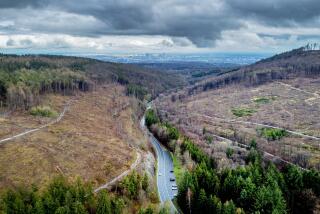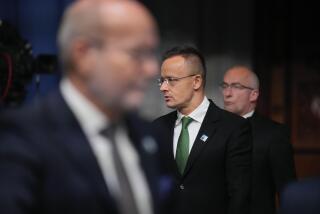Farm Aid Deadlocks the Common Market
- Share via
BRUSSELS — Leaders of the 12-nation European Economic Community meeting at an emergency summit were deadlocked Thursday over aiding poorer members and curbing huge agricultural subsidies.
“Matters are completely deadlocked, especially in the area of agriculture,” Dutch Premier Ruud Lubbers was quoted by a senior aide as saying at the close of the first day of a two-day meeting on the trade bloc’s financial crisis.
The Community, which is operating without a budget, failed twice in the last eight months to agree on how to curb spending and raise new revenue.
Earlier, West German Chancellor Helmut Kohl, the summit chairman, urged the squabbling Europeans to put nationalism aside.
Highly Charged Issue
“National go-it-alone policies are doomed to fail now,” Kohl told leaders as they gathered behind closed doors.
A demand from the EEC’s four poorest members--Greece, Spain, Portugal and Ireland--to nearly double over five years the 7-billion European Currency Unit regional aid package met with opposition from wealthier nations led by France and Britain. The package totals about $9 billion a year.
West Germany, which proposed a 50% ceiling on the increase, suggested a compromise of between 64% and 76%.
Britain and the Netherlands pressed for a modest increase in farm spending, which last year totaled 27 billion ECUs, or $33.8 billion, and accounted for two-thirds of the Common Market’s budget. They proposed an annual increase of 500,000 ECUs.
But France and West Germany, which both have important farming lobbies, proposed farm subsidies be increased by about 2.5 billion ECUs a year.
Members also were deadlocked over production ceilings on cereals and oil seeds, the two most expensive crops.
Officials were pessimistic about the prospects for an accord.
“We are not ready for an agreement,” said Michele Gendreau-Massaloux, spokesman for French President Francois Mitterrand. “The debate was broad but had the tendency to widen our differences.”
West German spokesman Friedhlem Ost characterized the chances of reaching an agreement as being, “to put it simply, 50-50 . . . . The devil hides in the details.”
While the leaders agreed to set up a 1 billion ECU reserve fund, they were at odds over how to use it.
Britain and the Netherlands insisted that the fund be used solely as a buffer against further drops in the U.S. dollar, which makes EEC exports more expensive.
But most other countries want the emergency money to also be available to protect EEC exports against trade disputes outside the Common Market.
“We don’t want to open a second door through which another mess can come in,” said Dutch government spokesman Nico-Jan Jonker.
British officials said Prime Minister Margaret Thatcher was agreeable to a West German plan to pay farmers not to produce.
Thatcher had wanted farm spending curbed by automatically cutting subsidies for surplus production based on strict quotas.
Assessment Change
“We’re not isolated. There are very complex alliances here,” said a British spokesman who asked not to be identified.
He was referring to the conflicts over regional spending, farm spending and to Italian protests about plans to change the system of levying contributions.
Italy will have to pay more for its Common Market membership under a proposal that bases contributions partly on a member’s gross national product instead of its annual sales tax receipts. Currently each member pays the EEC 1.4% the total sales tax it collects each year.
Italy objects to changing the current assessment method because its large black-market economy is reflected in its gross national product but not in its official sales tax receipts.
Since it is operating without a budget, the EEC has had to rely on monthly contributions based on 1987 spending levels ever since its regular winter summit last December ended in a deadlock over finances.
More to Read
Sign up for Essential California
The most important California stories and recommendations in your inbox every morning.
You may occasionally receive promotional content from the Los Angeles Times.













